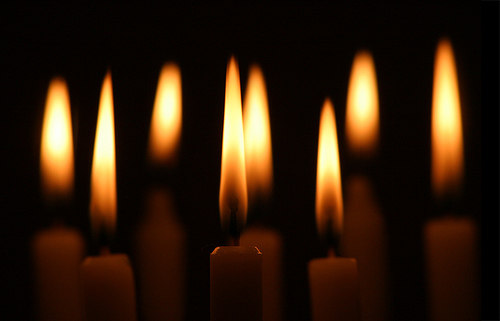Welsh Candles and a Ghost October 30, 2012
Author: Beach Combing | in : Modern , trackbackA couple of weeks ago we travelled to the Church Porch at midnight to see who would die in the coming year. Here is a Welsh equivalent (kind of).
Down to the last hundred years it was usual in many a district in Wales to burn candles in the parish church on the eve of All Souls, with a view of ascertaining what fortune would happen to the inquirers during the succeeding twelve months. These, consisting for the most part of young women, resorted after dark to the church, each carrying a candle with her. At the appointed hour all the candles were lighted by the sexton, whose presence and services on the occasion were considered indispensable. The act of lighting the candles was accompanied by every expression of gravity and earnestness, and the young women watched with the greatest anxiety their respective candles to see how they burned. If a candle burned brightly and clearly it augured favourably for its owner, and signified that prosperity and happiness would be her lot. If it burned slowly and gloomily, and in an irregular or crackling manner, then the person whose property it was would surely meet with trouble and misfortunes of various kinds. If, however, the candle went out before it had burned to the socket, then its owner was regarded as about to die in the course of the year; and, as little doubt had they on the subject as if the Angel of Death were seen at that moment sealing her fate. But not only did they observe the general manner in which the candles burned, or draw prognostications from the light of each as a whole, but they marked carefully how each portion burned, and these portions were supposed to represent the different parts of the year, so that they pretended to divine the various phases of their lives during the ensuing twelve months. When the last candle was burnt out they all left the church, and, having walked two or three times round the building, they proceeded homewards to bed, without uttering a single word to anyone. Not a syllable was to be spoken from the time of their quitting the church until they awoke on the following morning. If they had spoken to anyone the whole charm would at once have been broken, and all their labour would have been utterly lost. During their sleep on that night their lovers would appear to them, even those whom they should wed when the time was fulfilled which had been foretold by the fates.
Clearly the local population took this all very seriously that was, naturally enough, an invitation not to take the custom so seriously. Enter the clown…
In the same church [Llangian, near Pwllheli], on a similar occasion, the following occurrence took place: When all the diviners were in church, and all the candles on the point of burning out, a wag from the village resolved to go and frighten the credulous women. Accordingly he dressed himself in a white sheet, and proceeded, under cover of the darkness, towards the church door. The ground outside was much higher than the floor of the church, to reach which it was necessary to descend two or three steps. Having arrived at the door, the man leaned his back against it, that he might be prepared to encounter the women on their egress. The door was unfastened, and yielded to the weight of his person, and backwards he tumbled with a heavy crack into the church. If the divining women were terrified, much more was he himself, and hurt too. The bruises which he received from his fall compelled him to keep his bed for several weeks afterwards, and the annals of the village do not tell us that he ever repeated his experiment.
Any other candles in occult church ceremonies: drbeachcombing AT yahoo DOT com
***
4 Nov 2012: KJ writes: My late stepfather was a Protestant clergyman for many years. His churches mainly were in New England, with outliers in the Canadian Maritimes and New York State. One or two of the churches had a ‘watch night service’ on New Year’s Eve. The congregation would gather for prayer, bible study and light refreshments. As you can imagine, they were sparsely attended. However, my stepfather always keenly noted if the lit candles on the altar blew out for some reason. He believed that if the candles blew out, it would be a bad year for the church. If they remained lit, all would be well. I know at least one old sexton shared his belief, because he made sure the candles used were new and all drafts carefully blocked. Some of the older sea-faring types were quite superstitious about New Year’s Eve and believed that they would see the shades of those who were to die in the New Year on New Year’s Eve. I don’t think these beliefs were linked strictly with the church, however. Since many of the original settlers of these areas were originally from the British Isles, the traditions were transferred along with the household goods and altered to fit the circumstances. New Year’s Eve is also St Sylvester’s Eve, one of the old pagan celebrations subsumed into Christianity, and has long been associated with witchcraft and fortune-telling. Thanks KJ!



